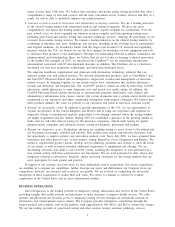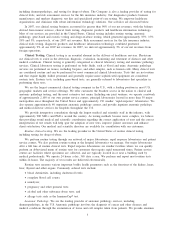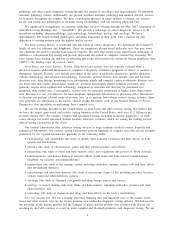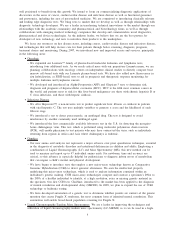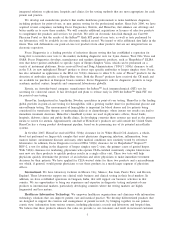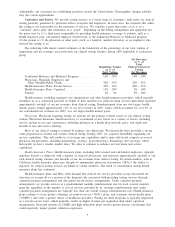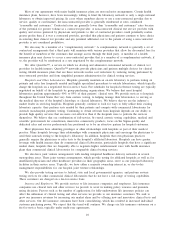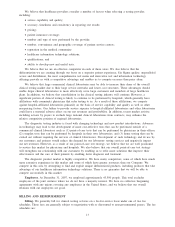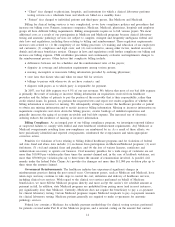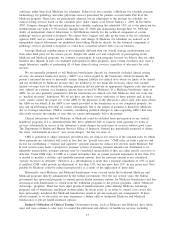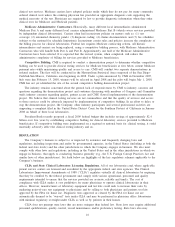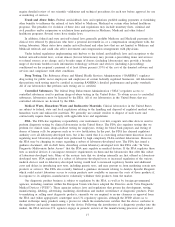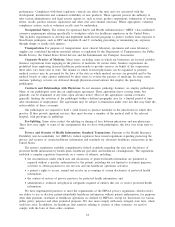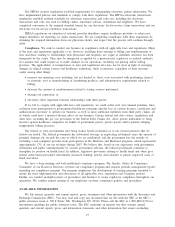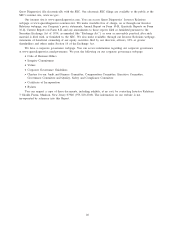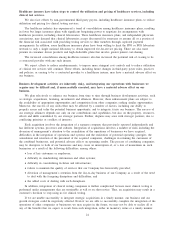Quest Diagnostics 2007 Annual Report Download - page 21
Download and view the complete annual report
Please find page 21 of the 2007 Quest Diagnostics annual report below. You can navigate through the pages in the report by either clicking on the pages listed below, or by using the keyword search tool below to find specific information within the annual report.Nichols Institute esoteric testing laboratory in California was the first clinical laboratory in North America to
achieve International Organization for Standardization, or ISO, 9001 certification. Several other of our
laboratories also are ISO certified. These certifications are international standards for quality management
systems.
We have extensive internal proficiency testing, quality control and audits for our clinical laboratory
operations. Quality control samples are processed in parallel with the analysis of patient specimens. The results of
tests on quality control samples are monitored to identify trends, biases or imprecision in our analytical processes.
We also perform internal process audits as part of our comprehensive quality assurance program.
We have external proficiency testing and accreditation for our clinical laboratory operations. All of our
laboratories participate in various external quality surveillance programs. They include, but are not limited to,
proficiency testing programs administered by the College of American Pathologists (“CAP”), as well as some
state agencies. CAP is an independent, non-governmental organization of board-certified pathologists approved by
the Centers for Medicare and Medicaid Services (“CMS”) to inspect clinical laboratories to determine compliance
with the standards required by the Clinical Laboratory Improvement Amendments of 1988. CAP offers an
accreditation program to which laboratories may voluntarily subscribe. All of our major regional and esoteric
laboratories and most of our rapid response laboratories are accredited by CAP. Accreditation includes on-site
inspections and participation in the CAP (or equivalent) proficiency testing program. Also, all of our
cytotechnologists and pathologists participate in an individual proficiency testing program.
Our diagnostic products businesses maintain extensive quality assurance programs focused on compliance
with applicable regulatory requirements in the United States, Europe and Australia. Focus Diagnostics, Enterix
and HemoCue maintain sites certified in accordance with, or audited to, ISO 13485.
Intellectual Property Rights. We own significant intellectual property, including patents, patent applications,
technology, trade secrets, know-how, copyrights and trademarks in the United States and other countries. Our
Company also is licensed under U.S. and non-U.S. patents, patent applications, technology, trade secrets, know-
how, copyrights and trademarks owned by others. In the aggregate, these intellectual property assets and licenses
are of material importance to our business. We believe, however, that no single patent, technology, trademark,
intellectual property asset or license is material to our business as a whole.
Our approach is to manage our intellectual property assets to safeguard them and to maximize their value to
our enterprise. We generally actively defend our intellectual property assets and pursue protection on our
products, processes and other intellectual property where possible.
Our success in remaining a leading innovator in the diagnostic testing industry by continuing to introduce
new tests, technology and services will depend, in part, on our ability to license new and improved technologies
on favorable terms. Other companies or individuals, including our competitors, may obtain patents or other
property rights on tests or processes that we may be performing, particularly in such emerging areas as gene-
based testing and other specialty testing, that could prevent, limit or interfere with our ability to develop, perform
or sell our tests or operate our business. As a result, we may be involved in intellectual property litigation and
we may be found to infringe on the proprietary rights of others, which could force us to do one or more of the
following:
•cease developing, performing or selling products or services that incorporate the challenged intellectual
property;
•obtain and pay for licenses from the holder of the infringed intellectual property right;
•redesign or reengineer our tests;
•change our business processes; or
•pay substantial damages, court costs and attorneys’ fees, including potentially increased damages for any
infringement held to be willful.
Competition. While there has been significant consolidation in the clinical testing industry in recent years,
our industry remains fragmented and highly competitive. We primarily compete with three types of clinical
testing providers: hospital-affiliated laboratories, other commercial clinical laboratories and physician-office
laboratories. Our largest independent clinical laboratory competitor is Laboratory Corporation of America
Holdings, Inc. In addition, we compete with many smaller regional and local commercial clinical laboratories,
specialized esoteric laboratories and laboratories owned by physicians and hospitals. In anatomic pathology,
additional competitors include anatomic pathology practices, including those in academic institutions. In addition,
there has been a trend among specialty physician practices to bring pathologists into those practices.
12


